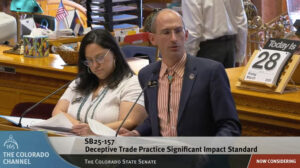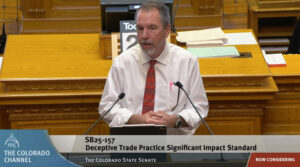Having advanced for the first time as far as the floor of the Colorado Senate, a bill to make it easier to file pricey deceptive-trade-practices lawsuits died there on Tuesday, despite one sponsor calling it a “test” of Democrats’ ability to stand up for everyday people.
Senate Bill 157, sponsored by Democratic Sens. Mike Weissman of Aurora and Julie Gonzales of Denver, fell on a 19-16 vote, with seven Democrats joining Republicans in the chamber in sending it to defeat. The rebuke came even after sponsors, for the second time in five days, added another amendment narrowing the scope of the new legal rights to only a certain number of groups of people who are disproportionate targets of fraud.
Though Democrats have expanded plaintiffs’ rights in recent years — including via a compromise last year to roughly triple the cap on noneconomic damages in medical malpractice lawsuits — the issue in SB 157 has been a bridge too far for some in the party. Dropping a mandate to prove “significant public impact” in filing deceptive-trade-practices claims, which allow for recouping triple damages and attorneys’ fees, could jack insurance costs for doctors and homebuilders and wreak havoc on those sectors, opponents warned.
Why the focus on deceptive trade practices?
Weissman — as he had in guiding similar bills out of the House while serving as a representative the past two years, only to see them die in the Senate Judiciary Committee — emphasized Colorado is one of just seven states requiring such proof of broad impact. Because of that, fraudsters feel more comfortable preying on state residents, causing $200 million in losses in 2024 and leaving the state ranked 18th for its 1,200 fraud reports per 100,000, he noted, citing Federal Trade Commission statistics.

Colorado state Sen. Mike Weissman speaks about Senate Bill 157 from the floor on Friday.
But after getting SB 157 through the Senate Business, Labor and Technology Committee last month, the sponsors narrowed its reach to try to win over moderates in their party who feared its potential consequences on businesses. They first passed an amendment on Friday that would grant the new legal right just to military service members, veterans, Gold Star widows, people at least 60 years old, residents with disabilities and pregnant women.
Then on Tuesday, they offered one further change that limited the ability of even those groups to file legal claims under the Colorado Consumer Protection Act against doctors. Even that couldn’t win over seven Democrats — Sens. Judy Amabile of Boulder, Lindsey Daugherty of Arvada, Janice Marchman of Loveland, Dafna Michaelson Jenet of Commerce City, Kyle Mullica of Thornton, Dylan Roberts of Frisco and Marc Snyder of Manitou Springs.
“A test for Team Blue”
Gonzales made an especially strong plea to her own party before the vote, asking if they really wanted to bar vulnerable Coloradans from bringing legal claims to defend themselves without finding significant numbers of others who have been harmed like them. Channeling efforts of fellow progressives to prove that Democrats are the party of working-class Americans, she described the bill as “a test for Team Blue,” mirroring language that has been used to advance a proposed overhaul to the Colorado Labor Peace Act.
“We’re at a moment right now where our constituents, the people of Colorado [and] quite frankly, our base across the country are begging us to do more to stand up for people against corporate power,” Gonzales said while looking at her side of the aisle. “I see this bill as a test on this question.”

Colorado Senate Minority Leader Paul Lundeen speaks against Senate Bill 157 on the floor Friday.
That argument was not enough to overcome concerns that easier filing of such pricey lawsuits — which supporters said is needed to attract more attorneys to take such cases — would add costs for Coloradans and make products and services more inaccessible.
Dropping the significant-public-impact qualifier could lead to a flood of construction-defects lawsuits that could drive some builders out of the single-family-home market and leave it stifled like the current condominium market, leaders of that sector warned. And doctors already facing higher-cost medical malpractice claims because of last year’s deal could decide it’s no longer worthwhile to practice in Colorado.
Fear from several sectors over increased lawsuits
Senate Minority Leader Paul Lundeen, R-Monument, estimated that increased liability costs that drive up insurance premiums could add between $7,200 and $18,000 to the price of the average home, based on how premiums currently add to housing prices. And with health-care providers needing to increase prices to cover rising malpractice premiums, that could drive costs of $4,500 to $9,000 per person, he added.
“It’s a deceptively short bill. And what it’s going to do is open a whole new realm of litigation in this state,” warned Sen. John Carson, R-Highlands Ranch. “I think it is driven by the interest of trial lawyers to open up new avenues for lawsuits here.”
The defeat of SB 157 was one of several wins in recent days for business groups who have argued that the weight of regulations in this state is hurting its competitiveness for expanding and relocating companies. House members passed a bill Monday that will make it harder to file construction-defects lawsuits against condo builders, and sponsors killed a bill Thursday that would have increased rules on employers whose workers spend significant time outside.
Business leaders are still fighting against regulation on several fronts, however, as well as pushing back against the advancing effort to make it easier to unionize. The House on Monday passed an amended version of a bill that seeks to make it easier for Coloradans with disabilities to sue businesses, and the Senate has given preliminary approval to a bill that could broaden the state’s law against price gouging.
